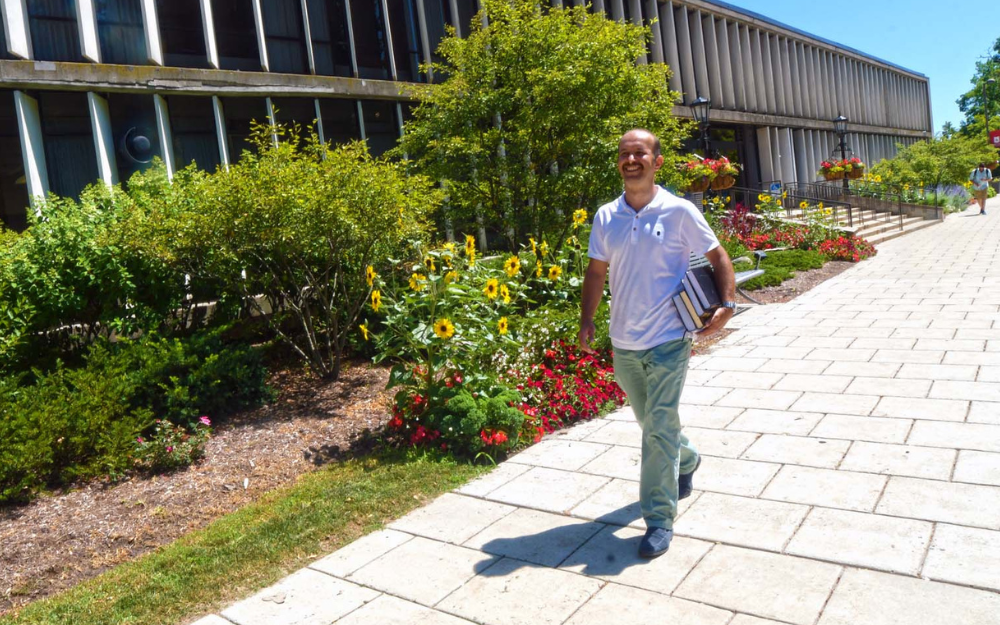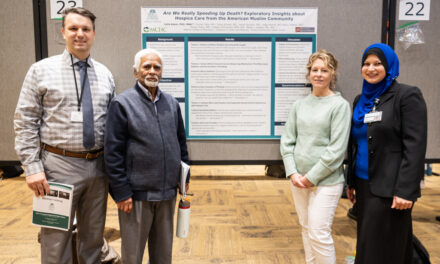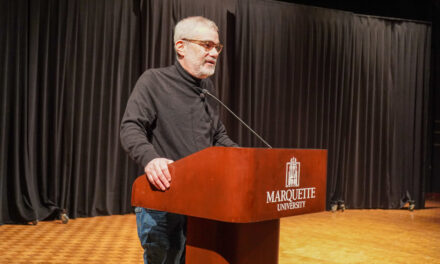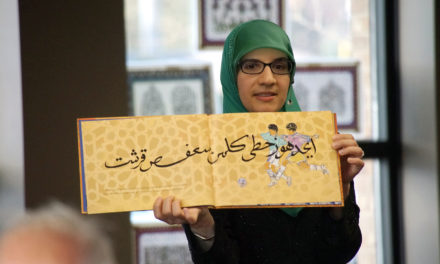Photo by Lila Aryan
Dr. Fatih Harpci, chair of the religion department at Carthage College in Kenosha, WI. and Rabbi David Cohen from Congregation Sinai, lead six sessions on the shared figures in Islam and Judaism.
Historic conflicts between the major religions often resulted from an unwillingness to listen. On Thursday evenings through December 22, Dr. Fatih Harpci and Rabbi David Cohen will give audiences a chance to listen to differing perspectives on a shared tradition. Their conversation which includes a Q&A on “Muslim and Jewish Understanding of the Biblical Narrative” are being held at Congregation Sinai. Participants can join at any point in the series, but registration is required. You can also register by calling Congregation Sinai at 414-352-2970.
Each session is devoted to scriptural figures common to Islam and Judaism, such as Adam and Eve (Hawwa), Avraham (Ibrahim) and Yitzhak (Ishaq), Moses (Musa) and Aaron (Harun). Harpci and Cohen will each speak for half an hour on the evening’s topic, followed by half an hour of discussion with audience members.
Both speakers come to the series with formidable credentials. Rabbi Cohen holds degrees in Near Eastern studies and education from Brandeis University and Stanford and is a senior rabbinic fellow at Jerusalem’s prestigious Shalom Hartman Institute. Dr. Harpci earned degrees in theology from the Moravian Theological Seminary and Temple University and chairs the religion department at Carthage College in Kenosha.
“In the course of the sessions, Muslims not only gain a deeper and more genuine understanding of the other, but they also gain a deeper and more truthful understanding of themselves,” Harpci said.
Prophecy is one of the common threads linking the two faiths and many prophets are shared. However, there are important distinctions. “Islam takes a much broader view of prophecy,” Cohen explained. “Whereas Judaism teaches that prophecy ended with the destruction of the Second Temple and the expulsion of almost the entire Jewish population to the farthest reaches of the Roman Empire, Islam traces prophecy all the way back to Adam, including many Biblical figures and also including Jesus, and all the way forward to Muhammad, the last prophet.
“From a Jewish perspective, prophets in the Quran have a wider role, not just to challenge the community’s leaders to ‘do better,’ but, as God’s messengers, to communicate God’s guidance directly to the people,” Cohen continued.
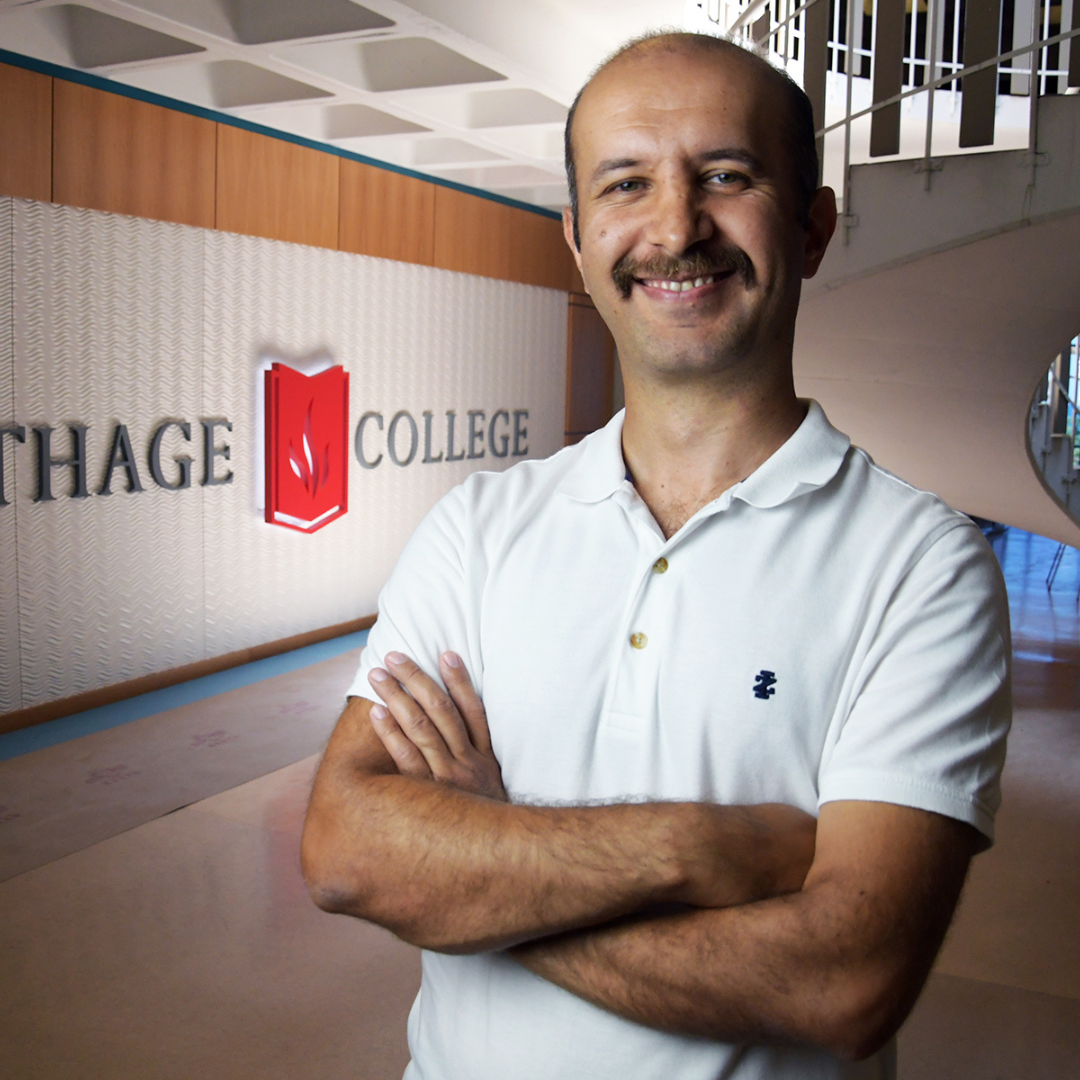
Dr. Fatih Harpci, chair of the religious department at Carthage College in Kenosha, WI
Islam and Judaism “share remarkable similarities regarding their respective moral and ethical values,” Harpci said. “Jewish and Muslim traditions emphasize justice, charity and compassion as guiding principles for their followers, in addition to the concept of covenant and prophets. While discussing Adam and Eve in the first session [on November 10], Jews and Muslims realized that, albeit the minor differences, there is a substantial similarity concerning the issues of sin and forgiveness. For instance, sin is not a cataclysmic fall from grace in Judaism. It is seen as a mistake that needs rectifying, which is very similar to the Islamic perspective.”
Cohen agrees. “The value systems between Judaism and Islam are quite similar in their essence,” he said. “Even so, the tenets of a faith and how it is actually lived are shaped by the host culture in which one is practicing. Jews living in Russia, Argentina, or California or Muslims living in Cairo, Chicago, Qom or Marrakesh—their religious practices are similar if not identical, but the flavor, music and culture are different. Even so, the concept of submitting to God’s will or fulfilling God’s desires and expectations are sibling concepts.”
Jews and Muslim are the two largest religious minorities in the U.S., and despite conflicts over Palestine, interfaith activities and cooperation is growing. Sharing the podium with Cohen is not Harpci’s first cross-cultural engagement with Milwaukee’s Jewish community.
In 2019, he spoke to members of Congregation Sinai about Islam and later gave a talk on Muslim dietary restrictions and their similarity to kosher practices at Congregation Sinai’s Culinary Showcase.
Last year during Ramadan, Jews from the congregation were invited to share an iftar meal at the Turkish American Society of Wisconsin. “Rabbi Cohen and I plan to lead these sessions on the shared figures for the two communities to interact with each other in depth. This should be seen as an opportunity to state one’s religious tradition and to clarify misunderstandings by listening to and answering questions or critiques others might have,” he said.
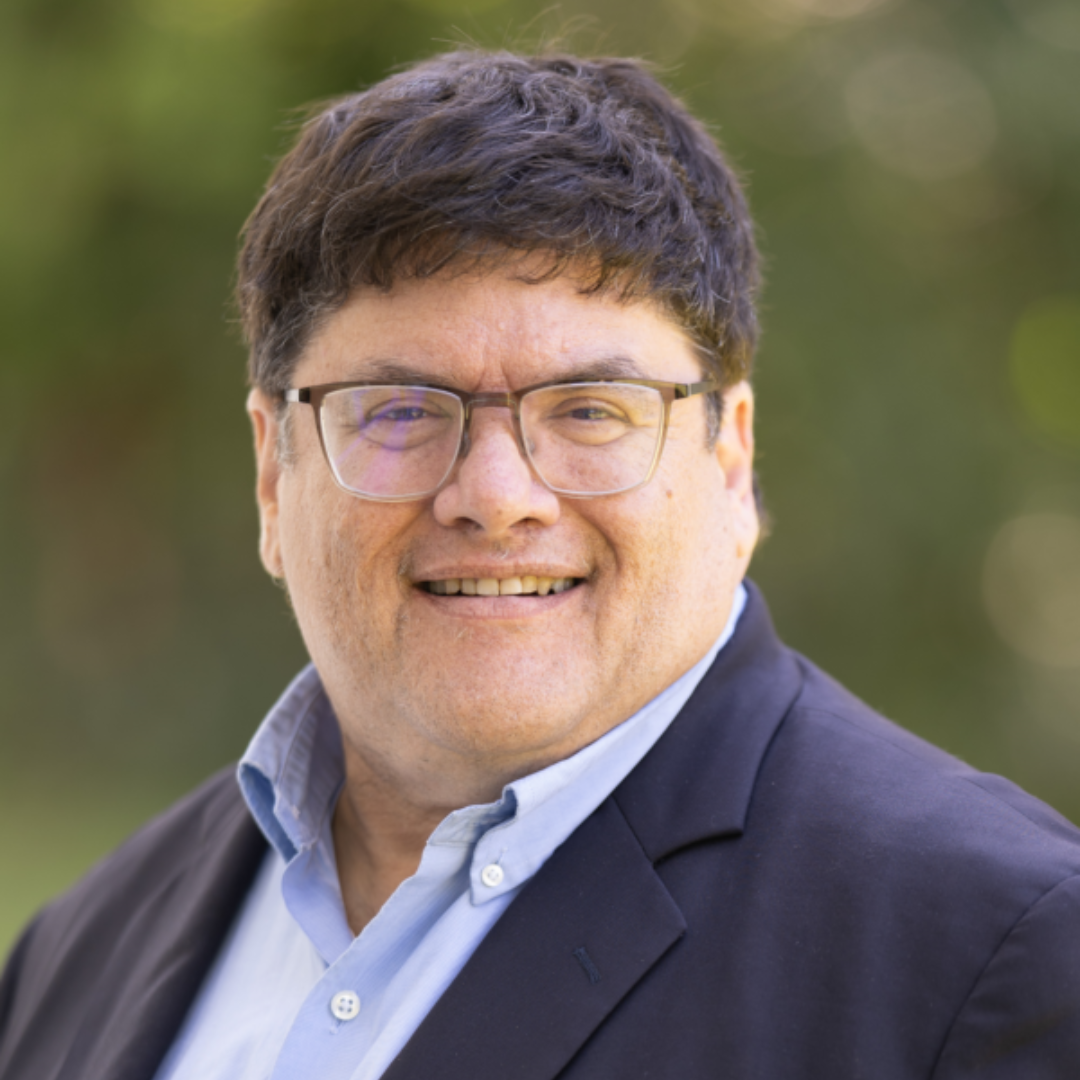
Rabbi David Cohen of Congregation Sinai in Fox Point, WI
Can religion heal the political divisions in the Middle East?
“Next question, please?” said Cohen with a chuckle. “In all seriousness, the answer to the question is wrapped in paradoxes. I mentioned about how local and regional culture shapes the practice of Islam and Judaism. At their purest level, the fundamental tenets of Judaism and Islam might well be a common language through which to begin a discourse. The Shalom Hartman Center in Jerusalem brings together religious leaders from both communities to study together regularly. Religion is the manifest topic of discussion, but the growth of personal relationships is an unstated yet powerful goal. If that same model of dialogue could be replicated it would lead to very good things.”
Harpci concurs. “I study diversity and do community outreach, emphasizing mutual respect and collaboration, which is an indispensable part of today’s global landscape,” he said. “I give special attention to conflict resolution and peacebuilding. While disputes and conflict are commonly attributed to political and racial factors, religion is often omitted from these analyses.
“We need to tackle the vacuum of knowledge about the role of religion in conflict resolution. The most urgent task of Jews and Muslims is to recover their place as defenders of human dignity and mutual respect and to show, in practice, and not only in words, that they can cooperate together for the common good.”
By this, he doesn’t mean that distinctions between the Abrahamic faiths should be discounted or ignored. “My teaching philosophy does not seek sameness but looks for understanding, appreciation and collaboration,” Harpci said. “People should realize that the distinctions are the components for learning, and common problems and divisions can be healed by interreligious cooperation, pooling energy and resources to tackle a problem that is too large for the agencies of one religion alone.”
The audience for the presentations by Harpci and Cohen has been enthusiastic. “I attended the first class last Thursday night. I plan to attend the rest of the classes as well,” said Randee Zitelman. “I expected to learn about how the Quran and Torah are alike and different, and how our peoples’ stories and beliefs, as written in our books, are understood and taught. Although I have tried to educate myself on the Islamic stories, I welcome the opportunity to learn from these brilliant teachers of Islam and Judaism … Even the smallest differences in our understanding of Adam and Eve help me see my world in new ways.”
The prophet Muhammad grew up alongside Jews in Medina, and through history, in many places and periods, relations between adherents of Islam and Judaism have been cordial and beneficial. “During the Middle Ages, the Jewish, Christian and Muslim communities on the Iberian Peninsula experienced a 700-year period of peaceful coexistence in Moorish Southern Spain, or Andalusia, called the ‘Convivencia,”’ Cohen said. During that time, he added, one of Judaism’s most esteemed scholars, Maimonides, “praised Muslims as ‘monotheists who abhor idolatry.’”
The series of dialogues with Dr. Fatih Harpci and Rabbi David Cohen continue on December 1, 8, 15 and 22 at Congregation Sinai, 8223 N. Port Washington Road,
The event at Congregation Sinai can be attended in person or on Zoom with pre-registration on Eventbrite. To attend any of the sessions register here or call Congregation Sinai at 414-352-2970.
